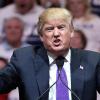Trump Opts Out of TPP and Makes China Great Again
World View
“Passing the TPP [Trans-Pacific Partnership] is as important to me as another aircraft carrier,” said former U.S. Secretary of Defense Ashton Carter two years ago, as the negotiations on the huge new free trade organization were nearing completion.
Given that the United States already has twice as many aircraft carriers as all the rest of the world put together, that comment could be taken several ways, but Carter actually did mean that the TPP was strategically important in his eyes. As it was for ex-president Barack Obama, who saw the TPP as America’s main tool for containing China’s growing influence in Asia.
China, deliberately excluded from the 12-member club, saw it that way, too. The official Xinhua news agency regularly referred to the TPP as “the economic arm of the Obama administration's geopolitical strategy to make sure that Washington rules supreme in the region.”
But the Obama administration is gone, and Donald Trump has just cut off that arm. “A great thing for the American worker, we just did,” Trump said after signing a document withdrawing U.S. support for the TPP on Tuesday.
In fact, quitting the TPP is unlikely to do American workers much good economically, but it may not do them much harm either. Most analyses have concluded that the deal wouldn’t have had much effect either way on U.S. wages and jobs—but leaving the TPP will certainly have a big impact on U.S. power and influence in the world.
Xinhua was right: For Obama, the TPP was always more about the strategic rivalry with China than it was about economics. It still is, but Trump’s electoral strategy has obliged him to declare war on free trade. The voters that Trump targeted most heavily were working-class Americans who felt betrayed and abandoned as well-paying jobs in manufacturing disappeared. However, there was no point in telling them that automation was destroying their jobs (which it is), because he could not plausibly promise to stop automation.
But if he claimed that the real problem was free trade, which allowed the Chinese and Mexicans and other sneaky foreigners to steal American jobs… well, he could certainly promise to stop that. He would build walls, cancel free-trade deals, even launch trade wars. It all sounded pretty credible, if you didn’t know that the vast majority of the lost jobs were really being stolen by robots.
So once he was in office, Trump was obliged to “unsign” the TPP deal, even though its main purpose, from Washington’s point of view, had been to perpetuate American economic and strategic dominance in Asia and freeze China out. In the eyes of Trump’s supporters (and maybe even in his own), he was slaying a dragon.
The biggest cost to the United States is the fact that America’s defection from the TPP doesn’t automatically kill the notion of an Asian free-trade bloc. Australia is already talking about keeping the TPP going without the U.S., but the likelier outcome is that the Asian members start trying to link up with China, Indonesia and even India in China’s proposed Regional Comprehensive Economic Partnership.
In that case, the United States could end up excluded from a free-trading bloc that includes half of the world economy. The dominant economy in that bloc would be China’s, so the main practical effect of Trump’s action would be to give a major boost to China’s power and influence in the world.
This pattern is likely to be duplicated in other areas where Trump is pledged to abandon long-standing U.S. diplomatic commitments. It is already happening in the domain of climate change, where Trump’s decision to “unsign” the 2015 Paris treaty to curb global warming has opened the door to a leadership role for China instead.
At the World Economic Forum’s annual meeting in Davos last month, China’s President Xi Jinping said that “all signatories must stick to” the Paris deal—“walking away” from the pact would endanger future generations. And while Trump is slashing U.S. spending on climate change, Xi has pledged to invest $360 billion in renewable energy in the next four years to reduce China’s greenhouse gas emissions.
It’s easy to look good in the eyes of the rest of the world when the standard of comparison is Trump’s administration. He is making China great again, even if that is not quite what he intended.













comments